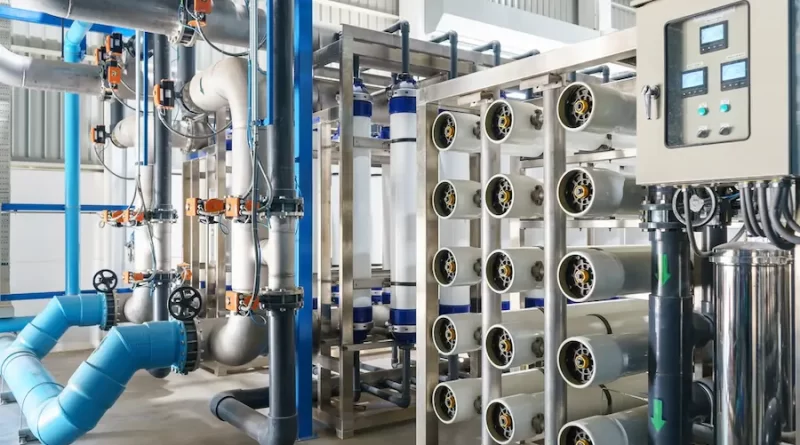What Is Reverse Osmosis Used For? 5 Needs For Filters
What is reverse osmosis used for?
Reverse osmosis, or RO, is a process that is commonly used for, Residential drinking water, Industrial water treatment, Pharmaceutical production, Food and beverage processing, Desalination of salt water and Laboratory and research application.
In this article, we will explore the various uses of reverse osmosis and how it can benefit you in different aspects of your life.
So, let’s dive in and discover the wonders of reverse osmosis!
Residential Drinking Water
So, what is reverse osmosis used for? Reverse osmosis is a highly effective method of water filtration that can remove contaminants, such as bacteria, viruses, chemicals, and heavy metals, from your tap water. This process works by forcing water through a semipermeable membrane, which traps impurities while allowing clean water molecules to pass through.
Reverse osmosis systems are typically installed under the kitchen sink and can provide a constant supply of clean, great-tasting water for drinking and cooking.
With reverse osmosis, you can have peace of mind knowing that you and your family are consuming water free from harmful substances, ensuring the health and well-being of everyone at home.
Industrial Water Treatment
If you need effective water treatment for industrial purposes, consider reverse osmosis.
Industrial water treatment involves treating and purifying water used in various industries, such as manufacturing, power generation, and food processing. Reverse osmosis can help remove impurities and contaminants from the water, ensuring its quality and safety for industrial applications.
This process uses a semi-permeable membrane to separate the water from dissolved solids, particles, and other pollutants. The water is forced through the membrane by applying pressure, leaving behind the impurities.
Reverse osmosis is an efficient and cost-effective method for industrial water treatment, providing businesses with clean and high-quality water for their specific needs. Whether for cooling systems, boiler feedwater, or product manufacturing, reverse osmosis can play a crucial role in maintaining the integrity and efficiency of industrial processes.
Pharmaceutical Production
When it comes to pharmaceutical production, reverse osmosis plays a vital role in ensuring the purity and safety of the water used in various processes. Here are four reasons why reverse osmosis is crucial in the pharmaceutical industry:
- Quality Assurance: Reverse osmosis helps remove impurities, contaminants, and particles from water, ensuring that it meets the strict quality standards required for pharmaceutical production.
- Product Safety: By eliminating harmful substances, reverse osmosis helps prevent potential contamination of pharmaceutical products, ensuring their safety for consumption.
- Consistency: Reverse osmosis provides a reliable and consistent source of purified water, which is essential for maintaining pharmaceutical formulations’ consistency and effectiveness.
- Compliance: Using reverse osmosis in pharmaceutical production ensures compliance with regulatory guidelines and industry standards, guaranteeing the production of safe and reliable medications.
Food and Beverage Processing
When it comes to food and beverage processing, reverse osmosis continues to play a crucial role in ensuring the quality and safety of the water used in these processes.
Reverse osmosis is widely used in the food and beverage industry to remove impurities, contaminants, and unwanted substances from water. This technology helps to improve the taste, appearance, and shelf life of various food and beverage products.
From preparing ingredients to cleaning equipment, reverse osmosis provides a reliable method for producing high-quality water that meets strict industry standards. Osmosis removes harmful substances such as bacteria, viruses, heavy metals, and chemicals, ensuring that the water used in food and beverage processing is clean and safe.
As a result, reverse osmosis plays a vital role in maintaining the integrity and quality of food and beverage products.
Desalination of Saltwater
When wondering what reverse osmosis is used for, it’s important to know that the method is also used in the desalination of saltwater, providing a reliable method for obtaining clean and drinkable water from seawater. This process significantly impacts coastal communities and regions with limited freshwater resources.
Here are four reasons why desalination through reverse osmosis is crucial:
- Water security: Desalination helps ensure a constant water supply, reducing dependence on limited freshwater sources.
- Public health: Access to clean drinking water improves public health, reducing the risk of waterborne diseases.
- Agricultural sustainability: Desalinated water can be used for irrigation, enabling sustainable agriculture and food production in arid regions.
- Economic development: Reliable access to water stimulates economic growth by attracting investments, creating jobs, and supporting industries.
Through reverse osmosis, desalination offers a viable solution to address water scarcity, enhance public health, promote sustainable agriculture, and drive economic development in water-stressed areas.
Laboratory and Research Applications
To explore the various applications of reverse osmosis in laboratory and research settings, you can employ this technology for numerous scientific experiments and investigations.
Reverse osmosis is commonly used in laboratories to purify water and remove impurities, such as ions, bacteria, and organic matter. This ensures that the water used in experiments is free from contaminants that could affect the results.
Also, reverse osmosis can be used in research applications to concentrate or separate specific substances from a solution. The solvent is forced through a semipermeable membrane by applying pressure to the solution, leaving behind the solute. This allows researchers to isolate and study specific solution components, aiding in developing new drugs, understanding biological processes, and advancing scientific knowledge.
Reverse osmosis has become an invaluable tool in laboratory and research settings, enabling scientists to achieve accurate and reliable results.
Conclusion
So, what is reverse osmosis used for? As you can see, reverse osmosis is a versatile and effective method in various industries and applications.
Rever osmosis plays a crucial role in providing clean drinking water in homes, treating industrial wastewater, and even producing pharmaceuticals and desalinating saltwater. Its efficiency and ability to remove impurities make it a preferred choice for many water treatment processes.
Overall, reverse osmosis is a reliable and essential technology that helps meet our water needs in different sectors.

